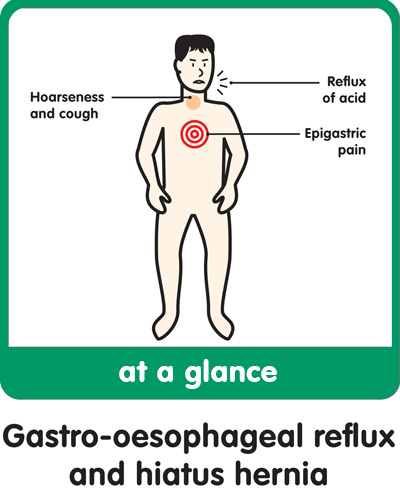Heartburn and Reflux

The name Heartburn is an umbrella term for common gastro-intestinal discomfort variously described by sufferers as indigestion, fullness, gaseousness, abdominal distension, burning pain in the upper abdomen, chest or behind the breastbone (epigastric pain). It is common for heartburn to have a burning quality to the pain, hence the name.
Mild heartburn is annoying, but severe heartburn can be frightening, feeling as if a hole is being burned through your stomach. Gastro-oesophageal reflux disease (GORD) is one of the most common complaints seen by GP’s. It occurs when the lower oesophageal sphincter (where the oesophagus joins the stomach), has become too relaxed, allowing the contents of the stomach back up into the oesophagus. The gastric acids will cause the burning feeling. Most of us feel this from time to time, but if it is a chronic condition, it is referred to as GORD.
Reflux is important because if it is experienced chronically, it can evolve into oesophageal cancer as the cells lining the oesophagus are damaged. Almost everyone will have occasional symptoms of reflux during their lives, and indeed it is the most common digestive reason for doctors’ visits. Almost half the people with chest pain that visit a GP are found to have heartburn and reflux. There is the old medical maxim,’ If a man in his thirties thinks that he is having a heart attack, it is probably heartburn; if a man in his fifties thinks he has heartburn, it is probably a heart attack’. It is better to be safe than sorry, so get your heart checked out if you have heartburn.
There are a number of potential causes of heartburn, and common lifestyle changes to reduce symptoms of heartburn include eating smaller meals and avoiding lying down within three hours of having a meal. Giving up smoking, reducing alcohol intake, losing weight and sleeping with the head of the bed raised can effective. If you exercise, choose activities such as walking, cycling or weight traing, which are less jarring than pursuits such as jogging.
Other more complex causes of heartburn can be various medicines (hormones as in the birth control pill, progesterone, diazepam and nitroglycerine). Persistent heartburn from a particular food may indicate an allergy to that food. Food allergies stimulate histamine release, which stimulates stomach acid production.
The most common offenders are dairy products, wheat, eggs, corn, beef, soy and some citrus fruits. Occasionally infection with the bug Helicobacter pylori in the stomach may cause heartburn. If you think this is a possibility, you can ask your GP for a blood test, breath test or endoscopy.
Common foods associated with reflux are alcohol, carbonated drinks, caffeine, chocolate, citrus fruits, milk and peppermint. It is advised to avoid high calorie, high fat meals. Also, chewing gum for one hour after a meal has been shown to help. Severe emotional stress can increase stomach acid production, which in turn can lead to heartburn, often for a considerable period of time after the stressful event has passed.
Symptoms of heartburn and reflux are:
Chest discomfort or pain under the breastbone
Wheezing
Nocturnal asthma
Hiccups
Bleeding or ulceration of the oesophagus
Hoarse voice
Vocal chord damage
Chronic cough
Hiatal hernia:
About half of those suffering chronic reflux and heartburn have an hiatal hernia., a defect in the diaphragm that allows part of the stomach to rise into the chest cavity. This makes it more difficult for the sphincter between the oesophagus and the stomach to close fully. This can sometimes be rectified with surgery.